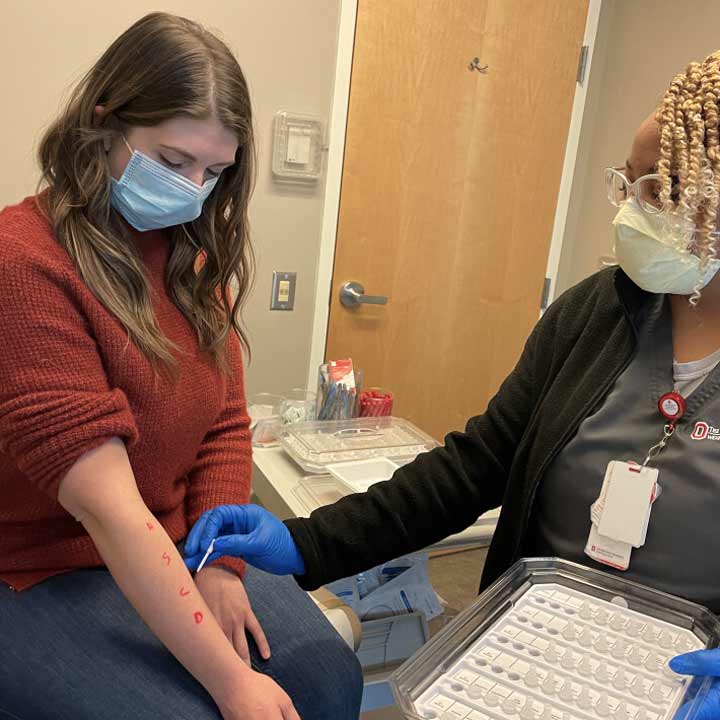 Allergic rhinitis, also known as hay fever, causes symptoms of a runny nose, sneezing and itchy, watery eyes, which can be quite the nuisance no matter if your condition is mild or more severe.
Allergic rhinitis, also known as hay fever, causes symptoms of a runny nose, sneezing and itchy, watery eyes, which can be quite the nuisance no matter if your condition is mild or more severe.
If you’re one of the 40-60 million Americans who deal with hay fever every year, you know these symptoms affect your sleep, ability to work and overall quality of life. They can make you moodier and more irritable, but you don’t have to live with these nagging sinus issues.
The ear, nose and throat (ENT) experts at The Ohio State University Wexner Medical Center are here to listen to how these symptoms impact your daily living and work with you to develop a treatment plan for your allergic rhinitis.
Not only are we a regional and national referral center for sinus care, but the Department of Otolaryngology – Head and Neck Surgery also has allergy and asthma specialists to help you figure out how to best manage your hay fever symptoms so you can get back to enjoying the activities you love.
What is allergic rhinitis (hay fever)?
Despite the nickname, hay fever doesn’t require exposure to hay or cause a fever. It’s simply a group of symptoms that affect the nose. While these symptoms are similar to a common cold, they aren’t caused by a virus.
Instead, hay fever is an allergic response to a harmless substance in the environment that for some reason the body thinks is harmful. That overreaction by your body causes inflammation in the sinus and nasal areas, which leads to the symptoms of allergic rhinitis.
There are two types of allergic rhinitis. They include:
- Seasonal – This occurs during certain times of the year (spring, summer and early fall) when you’re exposed to mold spores and the pollens of trees, grass and weeds.
- Perennial – You can experience these symptoms year-round as the result of being around pet hair or dander, dust mites, certain insects or mold.
It’s possible to have both types of allergic rhinitis, meaning your symptoms worsen when the seasons change.
Hay fever symptoms
Symptoms of allergic rhinitis are like those of other sinus and nasal conditions, so it’s important to talk with your doctor to help rule out other diseases that might be responsible for you feeling sick.
The most common hay fever symptoms are:
- Runny nose
- Scratchy, watery eyes
- Itchy mouth, throat and skin
- Sneezing
- Sinus headaches
- Dark circles under eyes
- Nasal congestion
- Fatigue
 What causes hay fever, or allergic rhinitis?
What causes hay fever, or allergic rhinitis?
There are several environmental triggers that can be responsible for your allergic rhinitis.
Possible hay fever causes include:
- Pollens from trees, grass or ragweed
- Dust mites and droppings from other insects
- Pet hair or dander
- Spores from mold or fungi
How does Ohio State diagnose allergic rhinitis?
You’ll want to make sure you let your doctor know all your symptoms, when those issues began and any exposure to possible allergens. If we think you might have allergic rhinitis, there are a few tests we can do to make a diagnosis.
Tests for diagnosing hay fever include:
- Skin prick test – We’ll prick small amounts of certain irritants (pollens, pet hair, food) into the skin on your back or arm. If a hive appears, then you are allergic to that substance.
- Allergy blood test – This measures immunoglobulin antibodies, or allergy-causing antibodies, in your bloodstream.
Allergic rhinitis (hay fever) treatments
If we determine what is causing your hay fever, it’s best to modify your lifestyle to avoid exposure to that substance as much as possible. Other modifications you can make include:
- Wear glasses when outdoors to minimize pollen getting into eyes
- Try not to rub eyes
- Stay indoors when pollen counts are at their highest
- Keep windows closed and air conditioner cleaned
- Wash your hands after spending time outside or petting animals
- Clean with a damp cloth or mop instead of dry dusting
- Use “mite-proof” bedding and wash bedding frequently
If your symptoms are minor, you may be able to use over-the-counter allergy medications or nasal sprays to alleviate symptoms. If they’re more severe, we can prescribe stronger medications or another relief method.
Types of medications and treatments used to manage allergic rhinitis include:
- Antihistamines – These block the release of histamines when you experience an allergic reaction. Examples of these include Claritin and Zyrtec.
- Decongestants – Medications like Sudafed can relieve congestion.
- Corticosteroid nasal sprays – These sprays help reduce inflammation.
- Allergy shots – A series of injections can make you less sensitive to pollen and provide longer-term relief.
We’ll also help you manage any other sinus and ENT conditions, such as a deviated septum or asthma, that might be making your hay fever symptoms worse.
Patient Forms
Additional Information
How would you like to schedule?
Don’t have MyChart? Create an account
